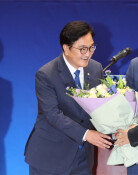[Opinion] Brain Drain
On May 18, 1965 in the White House, Korean President Park Jung-hee and U.S. President Lyndon Johnson announced a joint statement on 12 agendas after a Korea-U.S. summit meeting. In the last part of the statement, President Johnson said he proposed the establishment of a comprehensive research institute that would contribute to the development of Koreas industries, and President Park responded he welcomed the suggestion.
This was a special gift from Johnson with regard to the deployment of Korean troops to Vietnam, but according to Choi Hyung-seops memorandum, A Research Institute Where the Light Is Never Turned Off, it was overshadowed by other agendas and did not receive any particular attention.
After one year of preparations, the Korea Institute of Science and Technology (KIST) was established in 1966. The institute invited young scientists working in the United States, Germany and other countries by offering quite favorable terms for that time. Researchers were provided with an apartment for free and were promised three times what college professors were being paid. Briefed by KIST Director Choi Hyung-seop on such terms, President Park was said to have exclaimed, They are paid even more than I am! but to have immediately given the go-ahead.
With the development of high-tech industry, countries around the world are engaged in a heated brain-gain competition. In China, not only the central government, but also local governments are fiercely competing. Over 20,000 Chinese students studying abroad are coming back to their home country, and the number of information technology (IT) businesses founded by these students is said to exceed 3,000 in Beijing alone.
Last year, the city of Shanghai came up with a plan to attract 1,000 talented recruits from Hong Kong. In response, the United States, the United Kingdom and Germany are doing their utmost to prevent a possible brain drain.
The World Bank recently released a report stating that brain drain from poor countries helps those countries stay poor. The report analyzes that in the case of Ghana, Mozambique, Uganda, Jamaica and Nicaragua, most of the talent with college degrees have left their home countries to live in advanced countries, setting off a vicious cycle of poverty.
In a recent survey by Dong-A Ilbo, four in 10 Korean talents in the field of science and technology responded that they would leave for foreign countries if there had the opportunity. It also turns out that high-quality talents who studied abroad were highly reluctant to return home. Maybe this is why we cannot help thinking of the spirit for establishment of the KIST 40 years ago.
Song Dae-keun, Editorial Writer, dksong@donga.com







